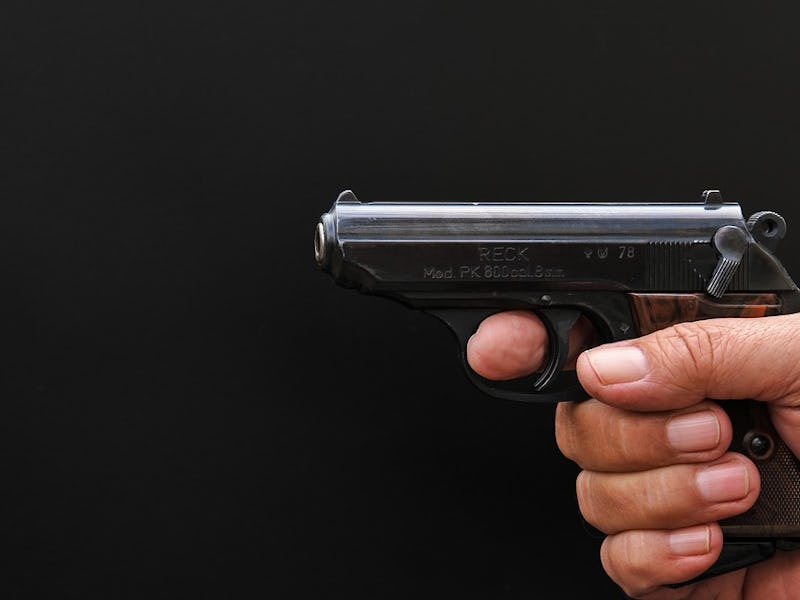Sweeping Survey on Guns Shows Large Swaths of Agreement, Except in One Area
Gun owners and non-gun owners agree on these requirements.

A month after the mass shooting at an El Paso, Texas, Walmart store that left 22 dead, Walmart’s top executive Doug McMillon announced the company would stop selling ammunition that can be used in military-style assault rifles, and phase out the sale of handguns and handgun ammunition entirely.
“We are respectfully requesting” customers no longer openly carry firearms into Walmart or Sam’s Clubs, McMillon writes in the open letter.
That request from the 52-year-old CEO has proved to be the most controversial of the measures, prompting some gun advocates to claim they will boycott the retailer.
Research published Monday in the journal Health Affairs shows that the ideological split on open-carry policies is in line with national trends, but that gun owners and non-gun owners are in large agreement on other matters, like background checks and licensing. Both segments also agreed to temporary gun removal by police if a person is a risk to themselves or others.
Statistically, gun owners are more supportive than non-gun owners of concealed-carry on college campuses, school grounds, and in public without a license.
But that doesn’t mean there isn’t some common ground in the concealed carry debate: The John Hopkins researchers also found that both gun owners and non-gun owners supported the requirement of safety training when applying for a concealed carry license. Overall, 73 percent of gun owners said they would support that requirement, while 83 percent of non-gun owners reported the same.
Both non-gun owners and gun owners agree on requiring safety tests.
Currently every state permits civilian concealed gun carrying, but only 35 states require people to apply for concealed carry permits. However, the research team notes that “no state requires people carrying concealed handguns to first demonstrate safe and lawful use and decision-making capacity analogous to licensing for drivers of motor vehicles.”
American opinions on gun policy have been tracked by the John Hopkins National Survey on Gun Policy every two years since 2013. The 2019 survey included 1,680 respondents, including 610 gun owners and 1,070 non-gun owners. Within this group, there were 499 Republicans, 531 Democrats, and 650 Independents. The 2019 survey was the first iteration to ask what people’s opinions were on a range of concealed-carry policies.
This study also compared public support for 18 gun policies, using survey data from 2015 and 2019. Overall, the most sizeable gap in support between gun owners and non-gun owners was when it came to policies about concealed carry — except for when it came to safety training.
More people supported universal background checks in 2019 than in 2015.
But apart from the divide over concealed-carry, large swaths of agreements emerged. Eighty-eight percent of all the respondents agreed that universal background checks should be required before purchasing a handgun, while 77 percent of all respondents supported purchaser licensing.
Both gun owners and non-gun owners also agreed on policies connected to “extreme risk protection order laws — laws that are designed to temporarily keep guns away from people who are at a high risk of committing violence.
Sixty-six percent of gun owners and 80 percent of non-gun owners stated that law enforcement officers should be authorized to temporarily remove guns from individuals determined to pose a threat to themselves or others. Meanwhile, 72 percent of gun owners and 82 percent of non-gun owners said family members should be able to ask a court to temporarily remove guns from a relative believed to be at risk of harming themselves or others.
In turn, research published in July demonstrated that laws dealing with universal background checks, permit requirements, laws banning people convicted of violent misdemeanors from possessing guns, and laws that allow local authorities to decide who is approved to carry a concealed weapon, are the most successful at reducing gun-related deaths.
So, if the laws that are the most effective at reducing deaths are the laws that gun-owners and non-gun owners agree on most, why aren’t they enacted? Some blame the National Rifle Association, arguing that what the guns rights advocacy group says is “anti-gun” is actually what Americans, including gun-owners, want.
“The rhetoric that the NRA has put out there that has scared everyone is that we have a choice: We either have to protect gun safety or we have to protect gun rights,” gun violence researcher Michael Siegel, M.D. told Inverse in July. “You don’t have to choose between them. The options that are effective for preventing gun violence are the exact options that best protect gun rights.”
Partial Abstract:
Gun policy is a prominent topic of debate in the 2020 US election cycle. Tracking evolving public attitudes about gun policy is critical in this context. Using data from the National Survey of Gun Policy fielded in 2013, 2015, 2017, and 2019 by the Johns Hopkins Center for Gun Policy and Research, we examined trends in support for more than two dozen gun policies over time by gun ownership status and political party affiliation, and across states. Most policies that we considered had majority support across the study period. We identified increases in public support over time for licensing and universal background checks of handgun purchasers, stronger regulation of gun dealers, and extreme risk protection orders.